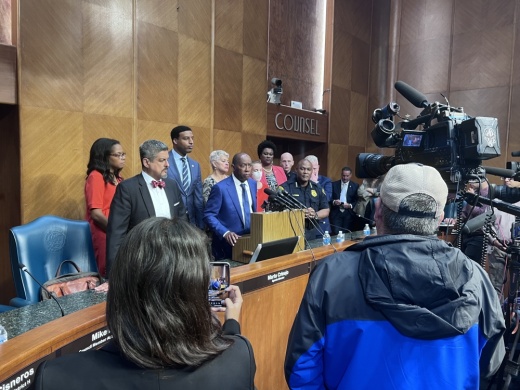As elected officials in Houston continue to focus on crime, more measures designed to deter and solve future cases are ramping up.
Houston City Council approved an ordinance in a 15-1 vote during its April 20 meeting that requires nightclubs, sexually-oriented businesses, bars, game rooms and convenience stores to have exterior security cameras and lighting. The ordinance is tied to Mayor Sylvester Turner’s One Safe Houston initiative, which features a batch of concepts meant to lower crime rates in the city.
“We have an obligation to do everything in our power to create a safe environment,” Turner said. “I think it’s important for us to send a clear message to people out there. ... If you’re hellbent on committing crimes, we are going to be out here shining a light on you to get you off the street so you’re not victimizing people out here.”
As previously reported by Community Impact Newspaper, the ordinance requires security cameras to cover from the exterior of a business to its property line, and the lights must be bright enough to illuminate a 6-square-foot surface.
Businesses have 90 days to install the cameras and lights. Once installed, owners or operators must keep video for 30 days.
In the event of an incident, footage must be provided within 72 hours if requested by the Houston Police Department. However, District C Council Member Abbie Kamin clarified at the meeting that HPD does need a warrant if a operator does not voluntarily hand the footage over.
At-large Council Member Mike Knox was the only member of the council to vote against the ordinance. Knox, a former police officer, said he believes in using surveillance cameras as a tool in law enforcement, but felt the ordinance violated the U.S. Constitution.
Knox also said he believes the five business types named in the ordinance are unfairly targeted. At the April 20 meeting, he cited HPD data showing more crimes take place at apartment complexes—which are not required to have cameras—compared to the five targeted business types.
Knox said he believes it would be better to make the lighting and cameras part of a voluntary program that can be incentivized.
“It’s unfair, it’s unlawful, and we need to rethink this,” Knox said.
However, Turner pushed back on constitutional objections, adding that the measures received little to no opposition during stakeholder meetings held prior to the council vote. Kamin, in support of the ordinance, said HPD identified the five business types as specific hotspot locations for crime.
Martha Castex-Tatum, vice mayor pro tem and District K council member, pushed for the ordinance, citing complaints from residents in her district about loitering, drugs and other crimes taking place at convenience stores. In the past, Castex-Tatum said her district saw success with cameras that were implemented to catch illegal dumping. She said she believes the cameras at these five business types would help deter other crimes in a similar manner.
“It may not be perfect, but it is good, and we are responding to the cries of our constituents,” Castex-Tatum said. “This is a way for us, when we go to those community meetings, to tell the residents we are doing everything possible to keep you safe in your communities.”
During an April 20 press conference, Turner was joined by HPD Chief Troy Finner to further discuss the new ordinance and provide updates on the Galleria mall shooting that took place April 16. According to Finner, the individual responsible for the shooting is now in custody. He said security footage from the cameras around the mall were instrumental in helping HPD’s investigation.
A handbook will be created to help guide businesses as they navigate all they need to comply with the ordinance, Finner said. A phone line will also be set up for business owners who have questions, he said.
“We are going to have a safer city,” Finner said.





